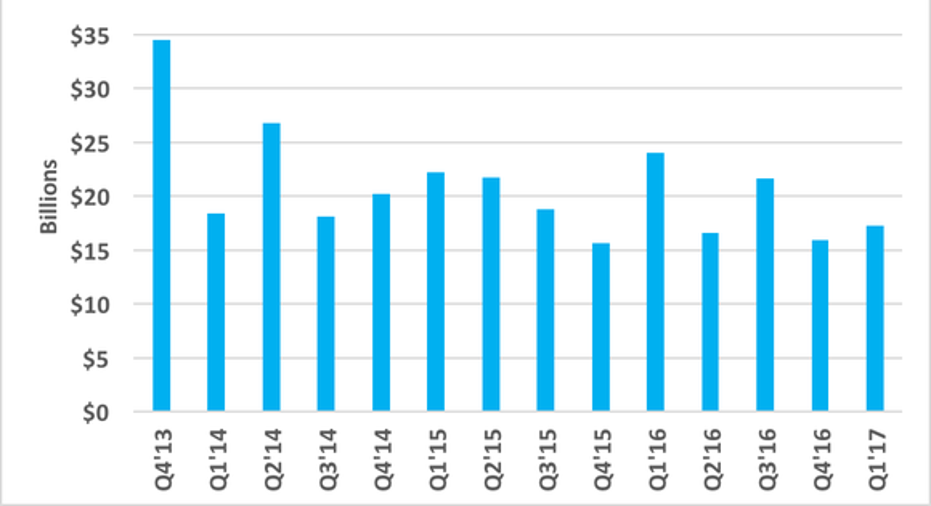Apple Sells $7 Billion in Bonds, Total Debt Now Over $100 Billion

Just a couple months after conducting a bond offering in February, Apple (NASDAQ: AAPL) is back to tap the capital markets once again. The last U.S. offering came in at $10 billion (it raised a modest $1 billion in Taiwan as well), and brought Apple's total debt to nearly $100 billion after including commercial paper, which is a short-term debt instrument often used for working capital purposes. After reporting earnings earlier this week, Apple filed a prospectus for another $7 billion offering.
Here's how it priced out.
|
Principal |
Fixed or Floating |
Rate |
Maturity |
|---|---|---|---|
|
$500 million |
Floating |
3-month LIBOR plus 7 basis points |
2020 |
|
$750 million |
Floating |
3-month LIBOR plus 35 basis points |
2022 |
|
$1 billion |
Fixed |
1.8% |
2020 |
|
$1 billion |
Fixed |
2.3% |
2022 |
|
$1.75 billion |
Fixed |
2.85% |
2024 |
|
$2 billion |
Fixed |
3.2% |
2027 |
Data source: Prospectus.
While most of Apple's debt carries fixed coupon rates, it typically enters into interest rate swaps to effectively convert those to floaters. At the end of last quarter, Apple had $88.5 billion in term debt. Total debt including commercial paper was $98.5 billion. With this week's offering, total debt including commercial paper is approximately $105.5 billion.
Apple Park, the company's new corporate headquarters. Image source: Apple.
Wait, where'd all the money from the last offering go?
At the end 2016, Apple's domestic cash position was $15.9 billion. At the end of the first quarter (before this most recent offering), that figure was $17.2 billion. So if Apple raised $10 billion in February, where'd all that cash go?
Data source: SEC filings. Chart by author. Calendar quarters shown.
Share repurchases. Apple bought back roughly $7 billion worth of stock last quarter, consisting of $4 billion in open-market purchases and a fresh $3 billion accelerated share repurchase (ASR) program. ASR programs require a large upfront payment initially, before the investment bank completes the program in subsequent months. That's why Apple's domestic cash only increased by about $1.4 billion sequentially, despite raising $10 billion during the quarter.
Bond offerings are becoming more frequent
It's worth noting that the frequency of Apple's bond offerings is accelerating, and that trend isn't likely to let up anytime soon. The company now has about $60 billion of remaining authorization on its share repurchase program, but that figure will inevitably get updated in about a year. Meanwhile, domestic cash is at the low end of Apple's comfort level, which is usually around $15 billion. Every time domestic cash dips that low, it boosts it with debt.
Over the past two years, Apple has repurchased on average $8.9 billion worth of stock per quarter, and with domestic cash running low, that begs the question of how much debt Apple will need to take out to keep funding the program.
Winning favors with Trump?
The ideal solution is the frequently discussed topic of repatriating some foreign cash. In the fall of last year, CEO Tim Cook said in a radio interview that Apple was actually already planning on repatriating several billion dollars as early as 2017, and that the company had "provisioned several billion dollars" to cover taxes. But that was before Donald Trump won the presidency, and since then Trump has talked an awful lot about a 10% repatriation tax. (The current repatriation tax rate is still 35%.) You can even see it scribbled on the whiteboard inthis picture taken in Steve Bannon's office earlier this week.
Separately, Apple just announced a plan to invest $1 billion in a fund intended to promote the creation of domestic manufacturing jobs, which is sure to win some political goodwill with our Tweeter in Chief.
That puts Apple in a precarious position, since the uncertainty will lead to inaction. You don't choose to repatriate at 35% if there is a very real possibility of a 10% tax on the horizon. In the meantime, Apple may just need to keep selling paper as it waits for more visibility around the tax environment.
10 stocks we like better than AppleWhen investing geniuses David and Tom Gardner have a stock tip, it can pay to listen. After all, the newsletter they have run for over a decade, Motley Fool Stock Advisor, has tripled the market.*
David and Tom just revealed what they believe are the 10 best stocks for investors to buy right now... and Apple wasn't one of them! That's right -- they think these 10 stocks are even better buys.
Click here to learn about these picks!
*Stock Advisor returns as of May 1, 2017
Evan Niu, CFA owns shares of Apple. The Motley Fool owns shares of and recommends Apple. The Motley Fool has a disclosure policy.